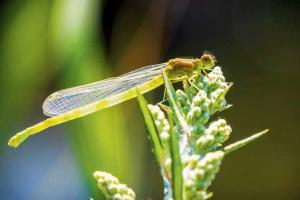New species discovered in the Western Ghats, which highlights its rich biodiversity

Five of the 12 species described in the last five years indicate the high potential for species discovery for odonates in Western Ghats
Three new species of reedtail damselflies (Protosticta) have been discovered in the Western Ghats, which is known as the biodiversity hotspot of India. The research was conducted by scientists Shantanu Joshi, KA Subramanian, R Babu, Dattaprasad Sawant and Krushnamegh Kunte.
ADVERTISEMENT
Speaking to mid-day, Joshi said, "We're happy to share that our research was published in the journal Zootaxa on September 30, where we described three new species of Protosticta damselflies from the Western Ghats."
There were nine endemic species of Protosticta known from the Western Ghats and with the new findings, the number has gone up to 12. Five of these 12 species (42 per cent) have been described within the last five years indicating the high regional potential for species discovery for odonates (insects).
The research also highlights important taxonomic and biological information on all the reedtail damselflies of the Western Ghats, including the previously known
Protosticta mortoni and Protosticta rufostigma.
"The idea for this research started when I was conducting some surveys in northern Karnataka. I was at a Myristica swamp (a unique habitat endemic to the Western Ghats) when I saw a remarkable damselfly, very small in size, flying among the roots of trees," said Joshi, who is associated with the National Centre for Biological Sciences, Bengaluru. "Later, I confirmed that this was an undescribed species. With my collaborators from Zoological Survey of India, we found two more species of the same genus that we had observed in the forests but that were not formally described." Joshi added.
Joshi also said that these discoveries add to the numerous endemic odonates known from the region, but more research and molecular analysis is needed to study relationships of Protosticta species in the Western Ghats with those in the Himalayas and South East Asia.
The research was supported by the National Centre for Biological Sciences, Bangalore, Zoological Survey of India and Rufford Foundation (UK). The researchers are also a part of citizen science platform – Odonata of India where citizens and scientists work together to generate valuable information on the distributional patterns and taxonomy of dragonflies and damselflies in India.
Keep scrolling to read more news
Catch up on all the latest Mumbai news, crime news, current affairs, and a complete guide from food to things to do and events across Mumbai. Also download the new mid-day Android and iOS apps to get latest updates.
Mid-Day is now on Telegram. Click here to join our channel (@middayinfomedialtd) and stay updated with the latest news
 Subscribe today by clicking the link and stay updated with the latest news!" Click here!
Subscribe today by clicking the link and stay updated with the latest news!" Click here!





_d.jpg)

